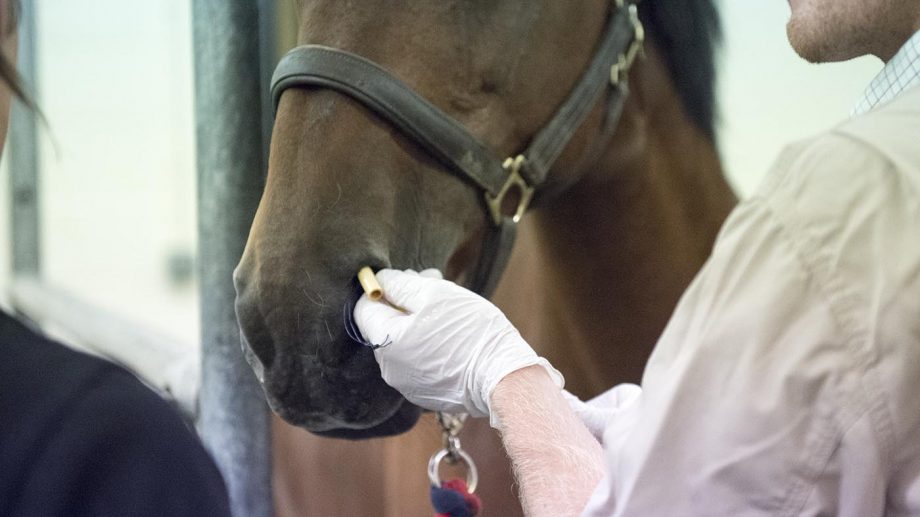A study into a new vaccination against strangles provides positive evidence, while separate research looks into the efficacy of a certain type of strangles testing. H&H looks at the research and gets the experts’ views.
A new strangles vaccine offers fresh hope of better protecting horses from the disease.
A study into the effectiveness of Strangvac, published in the peer-reviewed journal Vaccine, found “strong evidence” in support of the intramuscular vaccination.
The research team was made up of experts from the Animal Health Trust, the Swedish University of Agricultural Science, Karolinska Institutet and biotechnology company Intervacc, which develops vaccines.
They concluded the vaccine is a “valuable tool with which to protect horses from strangles, particularly during high-risk periods, while maintaining the mobility of horse populations as required by the global equine industry”.
They found it was “safe, immunogenic and effective” and did not cross-react with ELISA testing, which identifies horses that have been exposed to the disease, so it was possible to differentiate those from vaccinated animals.
The researchers added it is “particularly noteworthy” that immune memory cells persist over “at least a year, justifying a booster at any time during this period, in previously primed horses, at a situation where the risk of exposure is enhanced”.
David Rendle, a member of the British Equine Veterinary Association’s health and medicines committee, told H&H any progress in tackling the disease is welcome.
“The bacteria that causes strangles, Streptococcus equi, does not survive for long outside the horse and, unlike some other infections such as flu, or even coronavirus in people, it is an infection that could be relatively easily controlled if infected horses were all treated effectively and prevented from mixing until infection had been eliminated,” he said.
“Regrettably, not everyone is prepared to follow the appropriate steps for identifying and eliminating infection and carrier horses circulate in the equine population, spreading infection.
“A vaccine that provided robust and sustained immunity would be an invaluable tool in the control of strangles, which would not only enable responsible horse owners to protect their own horses from the severe forms of the disease, but would also help to reduce the risk of onward transmission to other horses.
“Further work needs to be done with this vaccine as other strangles vaccines in the past have shown initial promise and have then been disappointing when used in the field. If this vaccine is effective then it could be a significant step forward in tackling this horrible disease.”
Nic de Brauwere, head of welfare and behaviour at charity Redwings, which has a long-running strangles campaign, told H&H they feel it will be a “huge asset” to help combat the disease, alongside enhanced biosecurity practices and testing.
“Vaccination will also make it possible for owners to help protect their horses and continue with activities that involve travel or mixing with unfamiliar horses at events where other owners may not be as cautious about reducing the risk of strangles,” he said.
“The ability to restore a horse’s optimal immunity after a booster, within the 12-month window, should also give owners confidence that they can protect their horses in high risk situations at shorter notice than for example is possible with the equine influenza vaccine.”
Blood test questions raised
A separate study, published in the Equine Veterinary Journal, advised caution over relying on the use of certain blood (serological) tests for strangles antibodies.
The research by Andy Durham and Jeremy Kemp-Symonds found limitations in serological testing for certain antibodies in order to discount the possibility of a horse being a chronic carrier of the bacteria in his guttural pouch.
Mr de Brauwere told H&H the study is a “valuable reminder of the complexity of strangles” and raises further questions.
“In our experience, blood tests have been enormously helpful in narrowing down the search for carriers,” he said.
“But guttural pouch endoscopy and PCR testing has long been the gold standard for detecting carriers at Redwings, also allowing visual assessment and the treatment of infected pouches, which is what cures horses from being carriers. For blood tests to continue to contribute to screening with confidence, we need further research and development of improved tests.
“For us, the most important way to prevent strangles from spreading is the application of enhanced biosecurity practices, and we would like to see a bigger focus on preventing horses becoming carriers in the first place by scoping and treating all horses recovering from the disease.”
Vet Malcolm Morley told H&H the research is something for owners to be aware of and to speak with their vets about tests and options to come up with an appropriate plan for their yard and new arrivals.
He added that is not to say these blood tests are not useful, but rather there are limitations to be aware of when considering the context of whether it is going to be the appropriate test.
You might also be interested in…

Strangles: what is it, how to spot the signs, plus a new vaccine to help protect your horse

‘I was at my wits’ end’: owner speaks out after three-month battle with strangles
‘He appeared completely normal but he would have been a carrier and we wouldn’t have known’

Strangles initiative to run online as pandemic highlights biosecurity *H&H Plus*

Owners urged to take action over potentially fatal parasite

Goats take on clear round jumping in fight to beat grass sickness
Woody and Jessie from Toy Story, and an Oompa-Loompa, have also taken on the challenge
